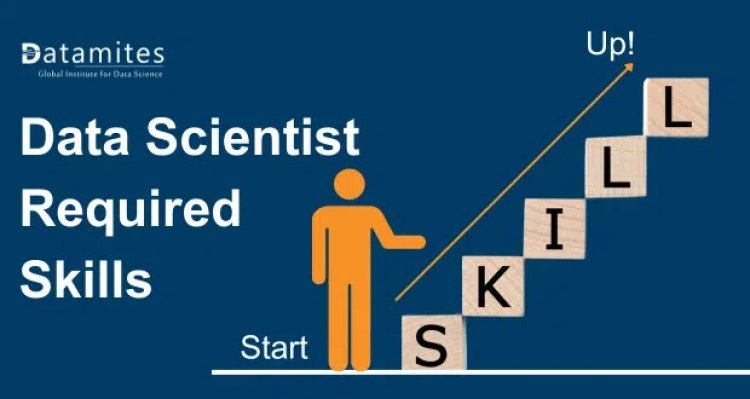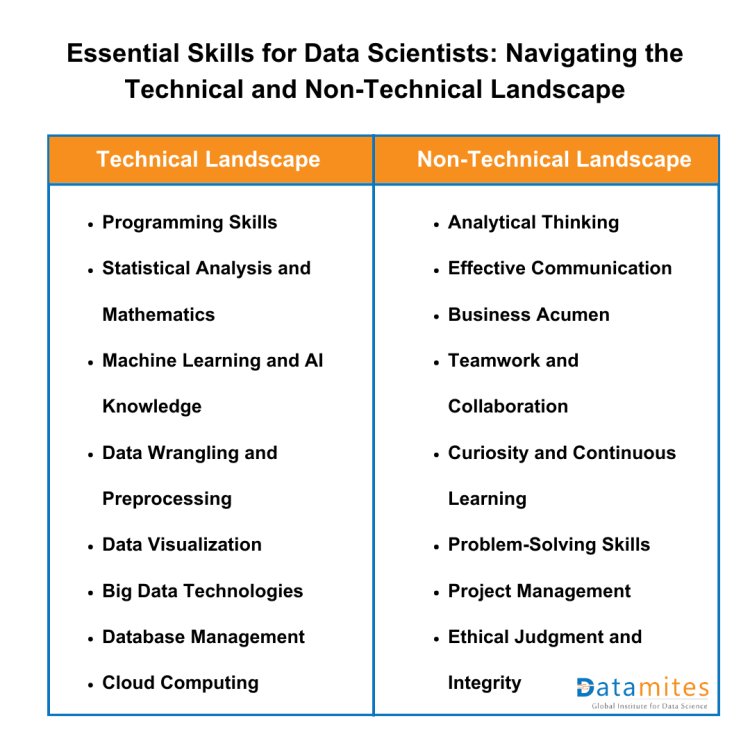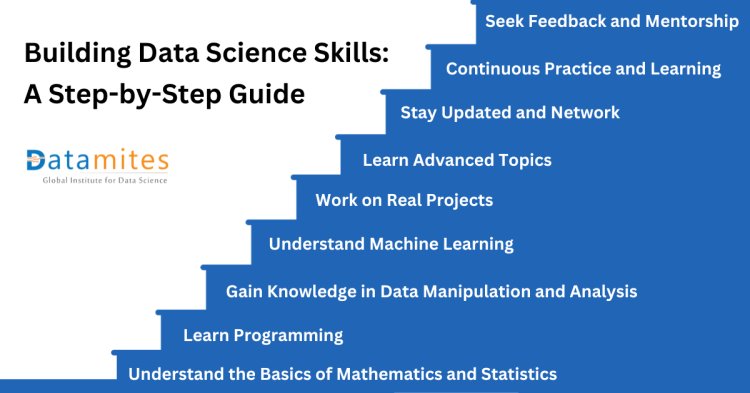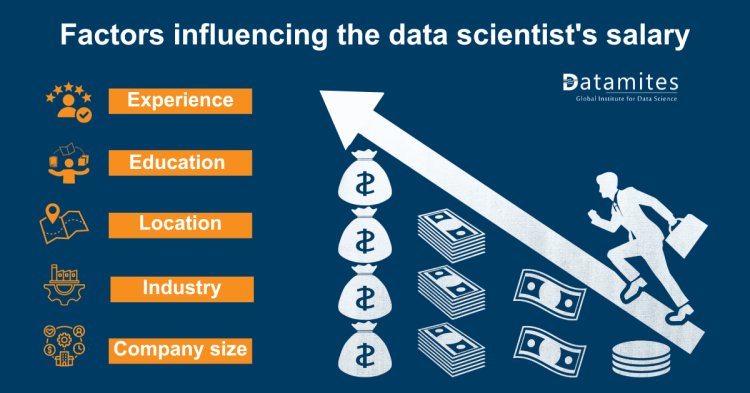Data Scientist Required Skills

The rising need for data scientists has made this field an attractive career option for both students and current professionals, including those who are not data scientists but have a deep fascination with data and its analytical processes. This trend has sparked curiosity about the specific skills in data science and big data that are necessary to embark on a career in this dynamic and evolving discipline.
According to Data Bridge Market Research, the data science platform market, valued at USD 122.94 billion in 2022, is anticipated to soar to USD 942.76 billion by 2030. This market is projected to experience a compound annual growth rate (CAGR) of 29.00% over the forecast period.
The utilization of Big Data for generating valuable insights has escalated the need for data scientists in various industries. Enterprises are turning to these professionals to enhance product development, boost customer loyalty, and discover new market opportunities through data analysis. In this discussion, we will delve into both the technical and non-technical abilities that are essential for data scientists to possess.
Refer to the below articles:
- What is Data Science in Simple Words?
- Guide to Data Science Career – Scope, Eligibility, Skills, Jobs, and Salaries
- How to Become A Data Scientist
Exploring the Role of a Data Scientist: A Comprehensive Overview
A Data Scientist is a professional who specializes in analyzing and interpreting complex digital data, such as the usage statistics of a website, sales figures, logistics, or transportation costs. These experts possess a blend of statistical, mathematical, programming, and problem-solving skills. Additionally, they have a keen analytical mind to discern patterns and insights from data, using advanced technologies and algorithms to process and extract meaningful information.
Significance of Data Scientists in the Modern Data-Centric Era:
In today’s era, where data drives most of our decisions, Data Scientists play a pivotal role. They turn vast volumes of data into actionable insights, helping organizations make informed decisions. These insights can lead to enhanced customer experiences, improved operational efficiency, and the innovation of new products and services.
The Data Science Platform Market had a valuation of USD 77.30 Billion in 2022 and is anticipated to achieve USD 674.51 Billion by 2030, with a projected compound annual growth rate (CAGR) of 31.10% from 2024 to 2030 according to a Verified Market Research report.
In industries ranging from healthcare to finance and beyond, Data Scientists are integral in interpreting data to shape strategies, solve complex problems, and predict future trends, thus steering businesses and policy-making in an informed direction.
Essential Skills for Data Scientists: Navigating the Technical and Non-Technical Landscape
Data science is a multifaceted field that requires a blend of technical and non-technical skills. Let’s break them down:
Technical Skills
- Programming Skills: Proficiency in programming languages like Python, R, and SQL. Understanding of libraries and frameworks relevant to data analysis, such as Pandas, NumPy, Scikit-learn, TensorFlow, and PyTorch.
- Statistical Analysis and Mathematics: Strong foundation in statistics, probability, and mathematics. Skills in hypothesis testing, regression analysis, and understanding complex algorithms.
- Machine Learning and AI Knowledge: Understanding of machine learning algorithms, such as supervised and unsupervised learning, neural networks, and reinforcement learning. Familiarity with AI concepts and their applications.
- Data Wrangling and Preprocessing: Ability to clean, manipulate, and preprocess data using various techniques and tools.
- Data Visualization: Proficiency in data visualization tools like Matplotlib, Seaborn, Tableau, or PowerBI. Ability to present data findings through charts, graphs, and dashboards.
- Big Data Technologies: Knowledge of big data platforms like Hadoop, Spark, and their ecosystems.
- Database Management: Familiarity with database systems, both SQL (like MySQL, PostgreSQL) and NoSQL (like MongoDB, Cassandra).
- Cloud Computing: Understanding of cloud services (AWS, Azure, GCP) and how they apply to data storage and computation.
Non-Technical Skills
- Analytical Thinking: Ability to approach problems logically and with critical thinking. This involves dissecting complex problems and formulating strategies for solving them.
- Effective Communication: Skills in communicating technical data insights to non-technical stakeholders. Ability to translate complex data into understandable narratives.
- Business Acumen: Understanding of the business environment in which the data science project is situated. Ability to align data projects with business goals.
- Teamwork and Collaboration: Ability to work effectively in a team, often in cross-functional teams that include other data scientists, engineers, product managers, and business stakeholders.
- Curiosity and Continuous Learning: Being inquisitive about new trends, technologies, and methodologies in the field of data science. Commitment to continuous learning and adapting to evolving tools and practices.
- Problem-Solving Skills: Capability to solve unforeseen issues creatively and efficiently.
- Project Management: Understanding of project management principles, including planning, scheduling, and task prioritization.
- Ethical Judgment and Integrity: Awareness of the ethical implications of data usage and commitment to maintaining data privacy and security standards.

Key Skills for Success in Data Science Across Different Domains
The key skills required for data scientists encompass a diverse range of competencies across different domains. Here’s a breakdown:
A. Statistical Analysis and Mathematics
This forms the foundation for many data science techniques and algorithms.
- Probability and Statistics: Essential for understanding data distributions, hypothesis testing, and statistical inference.
- Linear Algebra: Crucial for many machine learning algorithms, especially in handling multi-dimensional data.
- Calculus: Used in optimizing algorithms, especially in machine learning model training.
B. Programming and Coding Skills
Proficiency in programming is critical for implementing data analysis and machine learning models.
- Python and R: Popular programming languages in data science, known for their extensive libraries and community support.
- SQL: Necessary for extracting and manipulating data stored in databases.
- Data Visualization Tools (e.g., Matplotlib, Seaborn): Important for communicating findings and insights visually.
C. Machine Learning and Artificial Intelligence
Understanding these advanced techniques is key to tackling complex data-driven problems.
- Supervised and Unsupervised Learning: Fundamental categories of machine learning, each with its own set of algorithms and applications.
- Deep Learning: A subset of machine learning focusing on neural networks and algorithms inspired by the structure and function of the brain.
- Natural Language Processing (NLP): Involves the interaction between computers and human language, including speech recognition, text analysis, and translation.
D. Data Manipulation and Preprocessing
The process of preparing and structuring data for analysis.
- Data Cleaning: Removing inaccuracies and inconsistencies in data to improve its quality.
- Feature Engineering: Creating new input features for machine learning from existing data.
- Data Transformation: Modifying data into a format more suitable for analysis.
Also refer these below articles:
- Data Science Courses for Working Professional
- Data Science Course Journey for Beginners
- Data Science Courses for Managers and Executives
Building Data Science Skills: A Step-by-Step Guide
Building data science skills is a comprehensive process that involves learning a range of subjects, including statistics, programming, machine learning, and domain-specific knowledge. Here’s a step-by-step guide to help you build these skills:
1. Understand the Basics of Mathematics and Statistics
- Learn the basics of statistics: Focus on concepts like probability, hypothesis testing, descriptive statistics, and inferential statistics.
- Study linear algebra and calculus: Essential for understanding machine learning algorithms.
2. Learn Programming
- Choose a programming language: Python and R are the most popular for data science.
- Practice coding: Work on small projects or exercises to enhance your coding skills.
3. Gain Knowledge in Data Manipulation and Analysis
- Learn to work with data: Understand how to import, clean, manipulate, and visualize data.
- Tools and libraries: In Python, get familiar with Pandas, NumPy, and Matplotlib. In R, learn dplyr, ggplot2, and tidyr.
4. Understand Machine Learning
- Learn the basics of machine learning: Study supervised, unsupervised, and reinforcement learning.
- Implement basic models: Start with linear regression, logistic regression, decision trees, and gradually move to more complex models.
5. Work on Real Projects
- Apply your skills: Work on real-life data science projects. This can be through internships, personal projects, or online competitions like those on Kaggle.
- Build a portfolio: Showcase your projects in a portfolio to demonstrate your skills to potential employers.
6. Learn Advanced Topics
- Deep Learning: If interested, delve into neural networks and deep learning.
- Big Data Technologies: Learn tools like Hadoop, Spark, and SQL for working with large datasets.
7. Stay Updated and Network
- Follow the latest trends: Data science is a rapidly evolving field. Stay updated through blogs, journals, and conferences.
- Network: Join data science communities and forums to learn from others and share your knowledge.
8. Continuous Practice and Learning
- Keep practising: Data science is a field where practical application is key.
- Learn from mistakes: Analyze what went wrong in your models or code and learn from these mistakes.
9. Seek Feedback and Mentorship
- Get feedback: Share your work with peers or mentors to get constructive feedback.
- Find a mentor: Having a mentor in the field can provide guidance and help navigate your learning path.

What is the Worldwide Earning Potential of a Skilled Data Scientist?
The demand for skilled data scientists has skyrocketed and so is the salary. Let’s check the worldwide salary of a data scientist.
- The salary of a data scientist in the UK ranges from GBP 65,477according to a Glassdoor report.
- The salary of a data scientist in the USA ranges from USD 1,24,359 according to an Indeed report.
- The salary of a data scientist in India ranges from INR 13,50,000 according to a Glassdoor report.
- The salary of a data scientist in Canada ranges from CAD 1,07,134 according to a Glassdoor report.
- The salary of a data scientist in Australia ranges from AUD 1,13,546 according to an Indeed report.
- The salary of a data scientist in South Africa ranges from ZAR 6,77,529 according to an Indeed report.
- The salary of a data scientist in UAE ranges from AED 1,87,561 according to an Indeed report.
- The salary of a data scientist in Saudi Arabia ranges from SAR 316000 according to a Salary Expert report.
- The salary of a data scientist in Switzerland ranges from CHF 1,22,828 according to an Indeed report.
- The salary of a data scientist in Germany ranges from EUR 70,401according to a Glassdoor report.
Factors Influencing the Data Scientist’s Salary
A data scientist’s salary can be influenced by a variety of factors, including:
- Experience: More experienced data scientists typically earn higher salaries. Those with several years of practical experience and a track record of delivering valuable insights may command a premium.
- Education: The level of education can impact salary. Data scientists with advanced degrees, such as a Master’s or Ph.D. in a related field, tend to earn more than those with only a bachelor’s degree.
- Location: The cost of living and demand for data scientists vary by geographic location. Salaries are generally higher in major tech hubs like San Francisco, New York City, and Seattle, but they can also be influenced by local economic conditions.
- Industry: Different industries place different values on data science skills. Data scientists in finance, healthcare, and tech tend to earn more than those in non-profit or government roles.
- Company size: The size of the company can affect salary. Large corporations may offer higher salaries and better benefits compared to smaller startups or non-profits.

The Data Renaissance: Unveiling the Future of Data Science
The future of data science looks promising as it continues to evolve and play a critical role in decision-making across industries. With advancements in AI and machine learning, data scientists will increasingly focus on developing innovative algorithms, interpreting complex data, and driving actionable insights to solve real-world problems, making them invaluable assets in the data-driven world of tomorrow.
A data scientist should possess a diverse skill set that encompasses expertise in data analysis, statistical modeling, programming languages like Python and R, data visualization, machine learning, and domain knowledge. Additionally, effective communication and collaboration skills are crucial for translating data-driven insights into actionable solutions and working effectively within multidisciplinary teams. The ability to adapt to evolving technologies and a passion for continuous learning are also essential attributes for a successful data scientist in today’s dynamic and data-driven world.
DataMites Data Science Institute, which holds accreditation from the International Association of Business Analytics Certification (IABAC), offers a wide array of data science courses, covering fundamental and advanced topics, including artificial intelligence. This institute serves as an excellent starting point for those looking to learn and connect with a global network of data science professionals. For individuals with a keen interest in both technology and business, pursuing a career in data science is a wise decision. With its IABAC recognition, DataMites provides a strong educational foundation to kickstart an exciting career in this field.
Read these below articles:
- What are the Top IT Companies in India?
- How To Become Data Scientist In India
- Difference Between Data Science and Data Analytics
FAQs Related to Data Scientist Required Skills
1 Is coding necessary for data science?
Certainly, coding is a fundamental requirement in data science as it involves the utilization of programming languages such as Python and R for tasks like building machine learning models and handling extensive datasets.
2 Does the role of a data scientist fall within the realm of information technology (IT)?
To achieve success in their role, data scientists need to possess a solid grasp of both the technical and business aspects of data science. Ultimately, whether you categorize “data scientist” as an IT position or not depends on how you define the term. Nonetheless, it’s indisputable that data science plays a crucial role closely connected to the IT industry.
3 Can a career in data science be considered a secure choice?
Certainly, data science can be viewed as a stable career option. Nonetheless, it does carry some potential future uncertainties, leading prospective data scientists to contemplate whether to pursue it. One of the risks associated with a career in data science is the emergence of user-friendly tools.
4 Is there a demand for data scientists?
The field of data science is constantly evolving, and there is a rising demand for qualified experts. Here are five sought-after job positions that individuals aspiring to become data scientists may explore. The demand for data scientists persists in our data-driven world.
5 Does the role of a data scientist require a significant amount of mathematical knowledge?
Mathematics plays a crucial role in data science, aiding in problem-solving, model optimization, and the interpretation of intricate data to address business inquiries. Proficiency in solving every algebraic equation is not necessary, as data scientists employ computers for such tasks.
6 What is the level of difficulty associated with data science?
Data Science encompasses a broad spectrum of knowledge, and initially, it may appear daunting to comprehend all its fundamentals. However, with dedication, concentration, and a well-structured learning path, you will come to recognize that it is just like any other field and not challenging to acquire the necessary skills for entering the world of Data Science.
7 What is the ideal academic background for pursuing a career in data science?
To embark on a career as a data scientist, it’s essential to establish a strong foundation in statistical programming skills. Additionally, a deep understanding of data visualization, linear algebra, and programming is indispensable. Furthermore, a bachelor’s degree in fields such as computer science, mathematics, information technology, physics, or related disciplines is a prerequisite for this field.
8 Can you list the four primary branches or disciplines within the field of data science?
The realm of data science includes various subfields, including data analytics, data mining, artificial intelligence, and machine learning, among others.
9 What is the scope of data science?
Nevertheless, the opportunities for data science in India extend beyond these specific industries. Data scientists are also sought after in sectors like transportation, energy, and manufacturing. Furthermore, the data science field is in a continuous state of evolution, constantly introducing fresh applications and methodologies.
10 Who is the father of Data Science?
John Tukey made significant contributions to the field of statistical practice and data analysis, and he is often recognized as a key figure in the development of Data Science. At the very least, he laid the groundwork for many of the fundamental principles that later evolved into what we now call Data Science.
